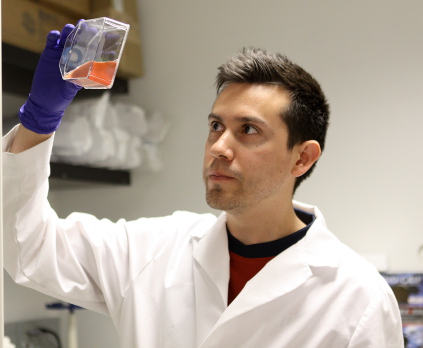By Nadia Macias
UTEP News Service
UTEP faculty and students will soon be journeying to the Caribbean island of Puerto Rico – not for a vacation, but to collaborate with researchers from around the country on serious health issues like leukemia, tuberculosis and Chagas disease.
The group of about 20 will attend the Research Centers for Minority Institutions’ (RCMI) International Symposium on Health Disparities – designed to highlight excellence in basic, translational and clinical research, and offer opportunities for sharing research information.
“Everyone who is attending has a similar mission to investigate health disparities and medical conditions prevalent and at a higher rate in their community,” said Robert Kirken, Ph.D., professor and chair of UTEP’s Department of Biological Sciences. “All the investigators have the opportunity to present and discuss their research findings with other scientists and find out what is working or not so that we may be able to improve our research and better our communities.”
Only projects deemed “of high quality and interest” are selected for the symposium, he added.
One UTEP student who will be attending is Blanca Ruiz, a Ph.D. candidate in pathobiology who is studying a cell surface receptor that has been linked to patients with autoimmune disorders such as rheumatoid arthritis and lupus.
“For most autoimmune diseases there are drugs that can alleviate symptoms but not stop the disease from progressing,” Ruiz said. “These diseases are very detrimental – it’s your own mechanism of defense attacking your body – so it’s very important to find better drugs to treat them.”
The receptor, known as Interleukin 2 Receptor beta, is important for the development and regulation of cells within the immune system. When this regulation is disrupted, cells can go “out of control,” which leads to the autoimmune disease.
Working in the same office as Ruiz, Steven Martinez, another Ph.D. candidate in pathobiology, will be presenting his work on leukemia, a disease that most frequently affects Hispanic children.
 Martinez is focusing on mutations of the enzyme JAK3 in people with acute myelogenous leukemia and acute lymphocytic leukemia.
Martinez is focusing on mutations of the enzyme JAK3 in people with acute myelogenous leukemia and acute lymphocytic leukemia.
“We’re trying to characterize these mutations and see if it’s possible that they are the driving force in these leukemias,” he said. “If they are, we’d like to test out JAK3 inhibitors, a new emerging drug type, and see if we can use them to combat the cancer.”
Assistant Professor Arshad Khan, Ph.D., another attendee, is working on obesity and diabetes – health issues that disproportionally affect minority populations.
At the symposium he will present his work on brain circuits and how he’s identified a region of the brain in rats as a likely feeding control region that can be stimulated for eating. The ultimate goal is to identify novel cellular targets for therapies to treat the disorders.
Other presentations by the UTEP researchers will discuss work on breast, prostate and liver cancer.
All researchers from the University attending the symposium are working in the Border Biomedical Research Center (BBRC), a preeminent center at UTEP that is focused on health and biomedical issues affecting the people of the El Paso/Juárez region of the Texas-Mexico border.
UTEP is one of 18 RCMI institutions in the United States and is funded by a $12.4 million grant from the National Institute of Minority Health Disparities (NIMHD). These funds provide salaries for UTEP scientists and support personnel, supplies, and travel funds to help finance the conference.
The symposium, themed “Translating Science to Better Health: The Power of Diversity and Multicultural Engagement,” officially convenes Dec. 10-13.
